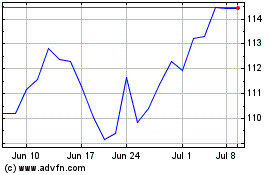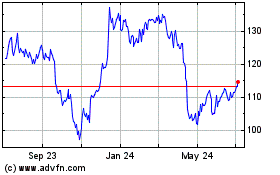Private-equity giant Blackstone Group LP has cut a deal to pay
$1.5 billion for a portfolio of logistics centers, in the latest
sign that this e-commerce-driven business is one of the hottest
area in the commercial-property industry.
Blackstone, the world's largest private real-estate owner, has
signed a contract to buy the 12 million-square-foot portfolio of
mostly West Coast property from LBA Realty LLC, an Irvine,
Calif.-based investment company with properties in the western
U.S., according to people familiar with the matter.
Once closed, the deal will mark Blackstone's biggest purchase of
U.S. distribution centers since it exited from the U.S. logistics
business in 2015 by selling IndCor Properties for $8.1 billion.
Logistics properties typically include warehousing and
distribution facilities for moving goods from manufacturers to
stores and customers.
Investor demand for such real estate has shown unusual
resilience during what many analysts and investors consider to be a
late stage of a bull market for commercial property. Prices keep
rising even as those in other commercial-real-estate sectors, such
as office buildings and malls, have shown signs of cooling.
Executives at logistics companies say their businesses are
benefiting from the growing importance of distribution in retail
and other industries. Increasingly, business profitability is being
determined by the efficiency, speed and costs of moving goods, they
say.
Some businesses, like retailing, are being completely
transformed by distribution as consumers migrate online, cutting
out the need for bricks-and-mortar stores. Many mall owners have
suffered while owners of logistics properties have been the big
winner from this trend.
"Distribution used to be just another part of the supply chain,"
said Charles Sullivan, president of U.S. operations for Global
Logistic Properties Ltd., the second-largest owner in the U.S.
sector. "Now logistics has moved up in its importance in corporate
strategy."
Big private-equity firms like Blackstone and foreign investors
such as Singapore's GIC Pte. Ltd. and the Abu Dhabi Investment
Authority have been among the most recent investors. Meanwhile,
other investors such as private-equity giant TPG, LBA and Ross
Perot Jr.'s Hillwood Development Co. have been responding by
putting logistics portfolios on the block. Hillwood sold a $1.1
billion portfolio earlier this month to Singapore-based Global
Logistic, whose major shareholders include GIC.
Stock investors also have been bullish. Big public logistics
companies such as Prologis Inc. are trading at a premium of about
7% to the value of their properties, according to analysts.
Companies that own other properties like malls, office buildings
and hotels are trading below asset values.
The logistics sector's strength is being fueled by rising demand
for space from Amazon.com Inc. and other Internet retailers. Rents
and occupancy rates are rising beyond the expectations of many
analysts and industry participants.
Net income of real-estate investment trusts that focus on
logistics, warehouses and other industrial property is expected to
rise 4.8% this year, more than any other property type except
apartment buildings and self-storage, according to Green Street
Advisors LLC. Last year, income in the industrial sector increased
4.5% versus the industry average of 4.2%.
Investing now could be particularly risky. An expected surge in
new supply in several parts of the country—including the Atlanta
and Dallas regions—could weigh on returns, analysts said, while the
torrid growth of e-commerce could slow. Because of razor-thin
margins and high delivery costs, online retail remains unprofitable
or barely profitable for many companies despite its surging
popularity.
But so far, demand growth from tenants is outpacing new supply,
according to analyst Eric Frankel of Green Street. "In some markets
there's meaningful new supply, but it's being absorbed very
quickly," he said.
Investor appetite for logistics property began growing in the
early years of the economic recovery and expansion partly because
they expected online retail to grow. Also prices were low thanks to
the pounding the sector took during the downturn.
As the economy strengthened, the sector was helped by
improvements in the home-building and automotive industries, both
heavy users of warehousing and distribution space. In some regions,
other factors fueled demand, including marijuana legalization.
"In the Denver market, all the functionally obsolete space got
absorbed by the marijuana industry," said Andrew Van Tuyle, chief
acquisitions officer of BH Management Inc., which owns about
500,000 square feet in that market. "All of a sudden the vacancy
for the overall industrial market became very low."
Changes in the online retail business also have fueled demand
for logistics space. As Amazon and others began offering faster
delivery, they began looking for so-called in-fill properties
closer to population centers that were partly designed to process
individual packages rather than pallets of goods bound for
stores.
TPG spent about $300 million of equity capital to build a
portfolio of about 16 million square feet of in-fill properties
starting in 2014, which it named Evergreen Industrial Properties.
Earlier this summer, the firm hired Eastdil Secured LLC to sell
Evergreen.
Blackstone was one of the early movers of the recovery in the
logistics market. It built its IndCor portfolio through about 18
acquisitions, often buying buildings from distressed sellers like
the Lehman Brothers estate. Blackstone cut a deal to sell IndCor to
Global Logistic in late 2014.
Blackstone made its IndCor investment through one of its
"opportunity" funds, which tend to make shorter-term, more highly
leveraged bets in pursuit of higher returns. Its purchase of the
LBA portfolio is through one of Blackstone's "core-plus" funds that
typically uses less leverage and hold investments for longer
periods of time, say people familiar with the matter.
Blackstone also owns 150 million square feet of logistics real
estate in Europe that it accumulated during the recovery. The firm
has been expected to try to sell it soon in an initial public
offering but so far hasn't announced its plans.
Write to Peter Grant at peter.grant@wsj.com
(END) Dow Jones Newswires
September 20, 2016 14:05 ET (18:05 GMT)
Copyright (c) 2016 Dow Jones & Company, Inc.
Prologis (NYSE:PLD)
Historical Stock Chart
From Mar 2024 to Apr 2024

Prologis (NYSE:PLD)
Historical Stock Chart
From Apr 2023 to Apr 2024
